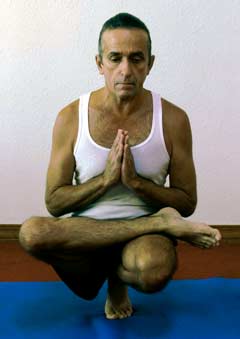Bending Stereotypes

Badgley focuses to perform advanced positions.
Yoga isn’t for the faint of heart.
“Athletes walk in here, take one look at me and think ‘yeah, right,'” said J.L. Badgley, 51, Joplin, yoga instructor.
Badgley has been teaching yoga for seven years and currently teaches at Suzanne’s Natural Foods. He said yoga exercises the mind, body and spirit.
The Journal of American Medical Association published a study in 1998 recommending a yoga exercise regimen for recovering cardiac operation patients.
The Yoga Journal suggested in June that yoga, and especially backbends, can help fight depression by stimulating the adrenal glands.
“People want to try and find it (health) in a prescription, or find it in a pill; they don’t actually want to put the effort into it,” Badgley said.
Badgley assures his students if they are willing to fully participate in the class, they will see results.
Dr. Ree Wells, associate professor of sociology, has been practicing yoga on and off for 25 years.
“I’m probably healthier now than a lot of other women my age, and I’m a lot more flexible,” she said.
Wells said some of the long-term benefits of yoga she has seen in her life are increased energy and mental concentration, weight control and stress reduction.
“It’s a great stress reducer for type A personalities,” Wells said. “Without yoga I’d be more intense and hyper than I am now.”
Dr. Betsy Griffin, assistant vice president for academic affairs, started a yoga routine because she wanted the upper body strength and increased flexibility. Griffin said she thinks athletes would be surprised by the intensity of some yoga routines and urges against stereotypes of yoga as a second-rate workout.
“If they think that, they haven’t tried it,” Griffin said. “I don’t think you can get a better workout than yoga.”
Wells encourages people to look beyond stereotypes to benefit the most out of the practice.
“It’s not for wimps; it’s really pretty intense,” Wells said. “I challenge folks to take one or two classes for three or four weeks before buying into that ignorant generalization.”
While the health benefits of yoga are applauded, long-time students remind people there are other benefits not as easily measured.
“Health can be defined as spiritual, mental, physical and social,” Wells said. “Yoga works across all those paths.”
Wells said yoga is based in holism, a philosophy focusing on strengthening the body’s forces and constitution, while most western medicine focuses on medical intervention and specific disease agents. But more than a health benefit, more people are recognizing the spiritual aspect and lifestyle of yoga.
“I practice kindness because everything falls into that,” Badgley said. “Yoga is a journey, not a destination. I’m more spiritual now than I’ve ever been before.”
Wells encourages people to investigate yoga whether or not they are interested in the spiritual aspect.
“You can approach it at different levels of involvement,” she said, “As a spiritual lifestyle or an occasional physical activity.”
Wells teaches a class called Sociology of Health and Wellness and focuses one module on alternative health care including yoga. Dr. Joy Dworkin and Dr. William Kumbier, professors of English and philosophy, have also practiced yoga for a significant amount of time.
People interested in more information on yoga can call Suzanne’s Natural Foods at 781-0909 for class times.
Your donation will support the student journalists of Missouri Southern State University. Your contribution will allow us to purchase equipment and cover our annual website hosting costs.















